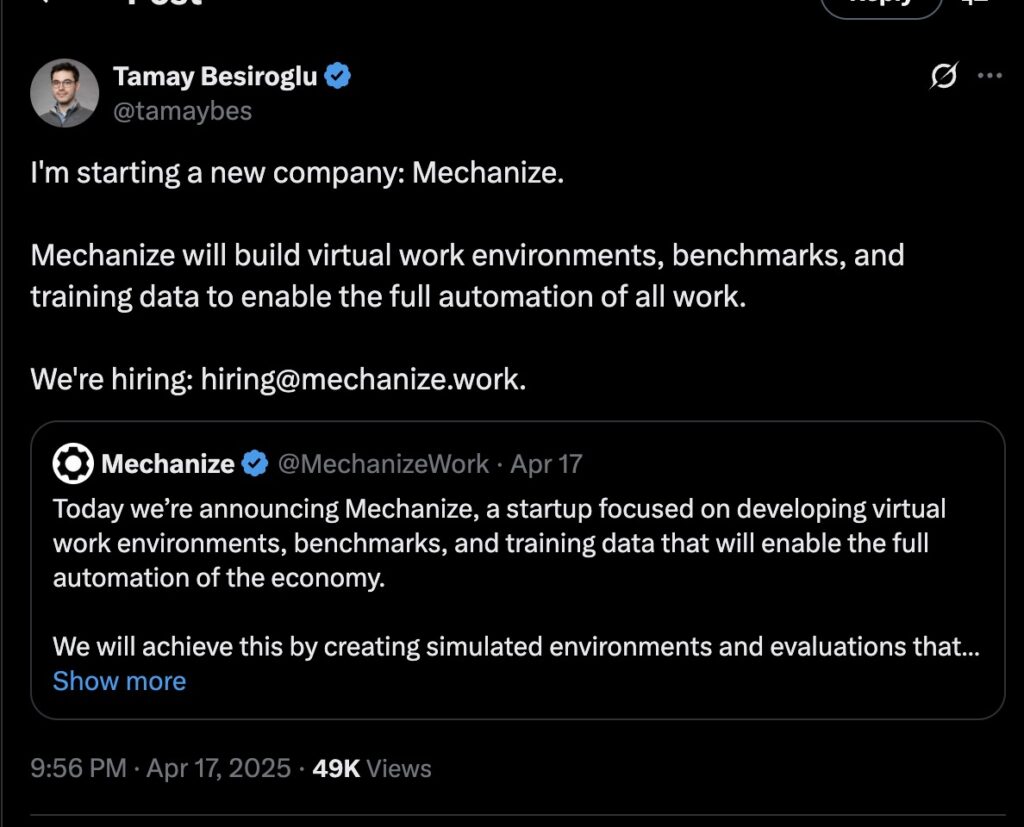
This AI Startup Isn’t Helping Workers It’s Planning To Replace Them
- By Upasana Banerjee
- Published on
Mechanize is not trying to make AI think like us it’s trying to make it work like us.


“The full automation of all work” is what Mechanize is aiming for when its founder Tamay Besiroglu, announced the launch of his new startup last Thursday on X.

Some users congratulated him, while some grilled him with satire.
Mechanize isn’t trying to build another chatbot or scheduling assistant. Its goal is deeper and more sweeping: to develop AI systems that can perform any task a human can do for economic value. From tax filing to copywriting, from data entry to diagnostics, from bookkeeping to basic legal work—nothing is off the table. Backed by a growing team of engineers and machine learning researchers, the company is building digital training grounds, virtual environments that simulate real-world workflows and allow AI agents to learn by doing. Using reinforcement learning, the AI will hone skills the same way humans do through trial, error, and feedback loops. But unlike humans, they never get tired, don’t need salaries, and scale infinitely.
One X user said, “So the goal is to make sure the only people who have any money are the people who own AI?”
The announcement lands amid a growing public debate over the risks and rewards of superhuman AI systems. With governments scrambling to regulate frontier models and industries already facing AI-driven disruption, Mechanize’s vision is both tantalizing and unsettling.
For a commoner, this gives rise to questions about job replacement. Is Mechanize aiming to substitute all human workers with AI agent bots? It seems the answer is a hard yes.
This sets Mechanize apart from most AI labs focused on general reasoning, agents, or creative tools. It’s not trying to make AI think like us it’s trying to make it work like us.
The most crucial metric for evaluating the capabilities of AI systems is arguably the degree to which they can automate economically valuable tasks, according to Besiroglu, who is also renowned AI researcher and founder of the non-profit AI research organization Epoch.
According to Fred’s economic data, workers in the US are paid around $18 trillion per year in aggregate. For the entire world, the number is over three times greater, around $60 trillion per year.
In his research, he posited that if labor can be automated, it can contribute to technological advancement. As a result, all the primary inputs driving the economy – labor, capital, and innovation – can keep pace with overall economic growth.
One user on X referred to this idea of absolute automation as “robbing people of their livelihoods.”
Mechanize’s ambitions strike at the heart of a growing shift: automation is no longer just about replacing factory workers or cashiers. It’s now gunning for white-collar knowledge work, the type of work many believed would be safe from AI disruption.
Already, OpenAI’s GPT-4 is writing legal memos. Jasper and Copy.ai are producing marketing copy. Harvey is automating law firm workflows. In India, Wipro is replacing tens of thousands of workers with AI tools. Even radiologists once thought immune are seeing AI models read scans faster, and sometimes more accurately, than seasoned doctors.
Therefore, this startup is the natural next step in this evolution but it doesn’t sugarcoat its mission. It’s not here to “assist” workers. But he mentioned, “We’re betting that the lion’s share of value from AI will come from automating ordinary labor tasks rather than from “geniuses in a data center.”
There is a brighter lens, too. Mechanize’s founder believe automation will ultimately free people from drudgery, allowing society to focus on creativity, relationships, exploration, and self-actualization. It’s a vision shared by technologists from Buckminster Fuller to Elon Musk: “Let machines do the work so humans can do more meaningful things.”
But that only works if the wealth created by automation is shared something history suggests is anything but automatic.However, according to a TechCrunch report, Besiroglu clarified that “our immediate focus is indeed on white-collar work” rather than manual labor jobs that would require robotics.
Nat Friedman, Daniel Gross, Patrick Collison, Dwarkesh Patel, Jeff Dean, Sholto Douglas, and Marcus Abramovitch are among the investors backing Mechanize.
📣 Want to advertise in AIM Research? Book here >

Cypher 2024
21-22 Nov 2024, Santa Clara Convention Center, CA
A Vendor Briefing is a research tool for our industry analysts, and an opportunity for a vendor to present its products, services and business strategies to analysts who cover the vendor specifically or a related technology or market.
AIM Research encourages technology vendors and agencies to brief our team for PeMa Quadrants, when introducing a new product, changing a business model, or forming a partnership, merger, or acquisition.


